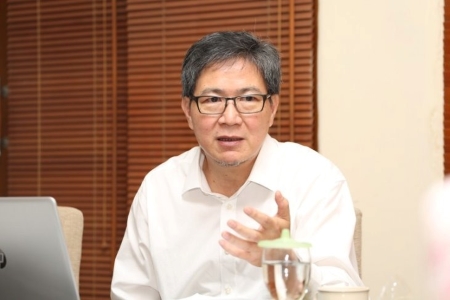Prof Ronny Rachman Noor: Daging Buatan Legal di Amerika, Bagaimana dengan Indonesia?

No one can deny that technology is the key to feeding the world, especially when the world’s population increases sharply in 2050.
One technology that has caught the world’s attention is artificial meat technology, where meat is no longer produced from raising cows, goats, buffaloes, chickens and other animals, but is fully developed in a laboratory.
According to Prof Ronny Rachman Noor, Genetic Expert at IPB University, the thoughts and concepts underlying this artificial meat are quite logical. This is because cattle farming, for example, contributes about 40 per cent of the world’s current deforestation. In addition, according to Our World Data and the World Health Organization (WHO), livestock farming also contributes to the world’s greenhouse gases by 14.5 per cent.
“Various modern livestock technologies have indeed succeeded in reducing the rate of deforestation and greenhouse gas emissions. However, this effort certainly needs to be combined with other technologies such as artificial meat technology,” said Prof Ronny.
Recently, the United States through the United States Department of Agriculture (USDA) has approved the sale of artificial meat. This approval listed America as the second country in the world after Singapore was the first country to approve it.
In addition, according to Prof Ronny Noor, the US Food and Drug Administration (FDA) has also issued a statement that after examining the manufacturing process and products, this artificial meat is safe for consumption.
“This era of artificial meat is a new era in the world of animal science, because the various products that will be produced from this artificial technology, in terms of physical form, aroma, aesthetics and taste are almost the same as natural meat produced from livestock,” said Prof Ronny.
“In addition, this artificial meat technology certainly provides an alternative to produce meat that is more environmentally friendly and more humane and also an alternative for vegetarian groups who are not satisfied with vegetarian products that already exist in the market,” he continued.
He further elaborated that the production of artificial meat begins with the collection of animal tissue samples. The samples are filtered and grown to make a cell bank that will be used in the next process.
In a controlled environment, these cells are put into a closed container to be cultured by adding nutrients and other essential ingredients for cell growth and development.
Under these controlled conditions and environments, the cells will grow in the trillions. Furthermore, with differentiation technology, these cells will differentiate to form muscle, fat and connective tissue cells.
“Through this technology, the cells will grow and differentiate and form the desired type of meat to be produced and marketed,” he continued.
According to Prof Ronny, although this artificial meat product has the same flavour as traditional meat produced from livestock, the success of marketing this artificial meat will depend on consumer tastes and perceptions. For example, in America, a poll showed that 50 per cent of the American population said they would never try this artificial meat.
“In Indonesia, which is currently experiencing limited land for commercial farming, this artificial meat technology will also develop in the future and is expected to take some of the market share of natural meat. Although it will not replace natural meat completely,” said Prof Ronny.
“Perception, consumer acceptance and higher prices are expected to be the main obstacles to marketing artificial meat in Indonesia, in addition to of course the most crucial issue is the certainty of the halalness of all the processes of making artificial meat,” he added.
Prof Ronny believes that as an alternative to solving livestock problems, especially those related to environmental pollution, artificial meat is certainly beneficial. However, he ensures that it will not be able to fully replace natural meat. (*/Rz) (IAAS/RUM)



